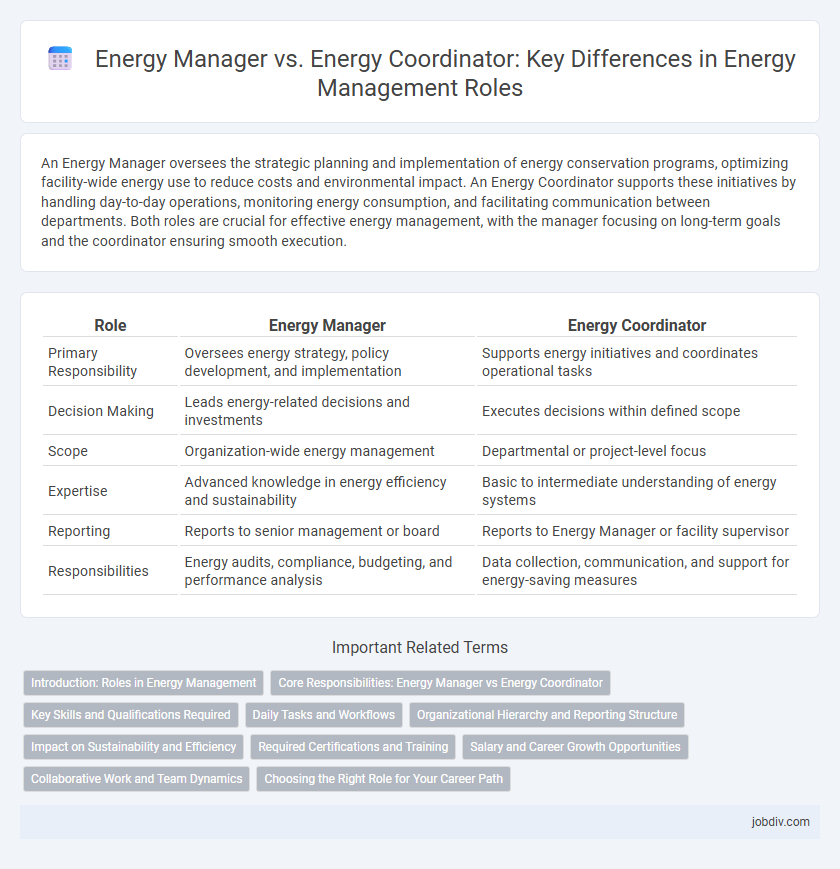An Energy Manager oversees the strategic planning and implementation of energy conservation programs, optimizing facility-wide energy use to reduce costs and environmental impact. An Energy Coordinator supports these initiatives by handling day-to-day operations, monitoring energy consumption, and facilitating communication between departments. Both roles are crucial for effective energy management, with the manager focusing on long-term goals and the coordinator ensuring smooth execution.
Table of Comparison
| Role | Energy Manager | Energy Coordinator |
|---|---|---|
| Primary Responsibility | Oversees energy strategy, policy development, and implementation | Supports energy initiatives and coordinates operational tasks |
| Decision Making | Leads energy-related decisions and investments | Executes decisions within defined scope |
| Scope | Organization-wide energy management | Departmental or project-level focus |
| Expertise | Advanced knowledge in energy efficiency and sustainability | Basic to intermediate understanding of energy systems |
| Reporting | Reports to senior management or board | Reports to Energy Manager or facility supervisor |
| Responsibilities | Energy audits, compliance, budgeting, and performance analysis | Data collection, communication, and support for energy-saving measures |
Introduction: Roles in Energy Management
Energy Managers oversee comprehensive energy strategies, focusing on optimizing consumption, reducing costs, and ensuring regulatory compliance across organizations. Energy Coordinators support these initiatives by facilitating communication, tracking energy usage data, and implementing specific energy-saving projects. Both roles are critical within energy management teams, with Energy Managers driving policy and decision-making while Energy Coordinators handle operational execution and monitoring.
Core Responsibilities: Energy Manager vs Energy Coordinator
Energy Managers oversee comprehensive energy strategy development, conduct detailed energy audits, and implement efficiency programs to reduce overall consumption and costs. Energy Coordinators focus on assisting with energy data collection, supporting sustainability initiatives, and facilitating communication between departments to ensure compliance with energy policies. Both roles are essential, with Energy Managers driving strategic decisions and Energy Coordinators managing operational execution.
Key Skills and Qualifications Required
Energy Managers require expertise in energy auditing, project management, and regulatory compliance, with a strong background in engineering or environmental science. Energy Coordinators excel in data analysis, stakeholder communication, and implementation of energy-saving initiatives, often holding certifications such as Certified Energy Manager (CEM) or energy efficiency training. Both roles demand proficiency in energy management systems (EMS) and a deep understanding of renewable energy technologies and sustainability practices.
Daily Tasks and Workflows
Energy Managers oversee strategic planning, analyze energy consumption data, and implement efficiency programs to reduce operational costs. Energy Coordinators handle day-to-day monitoring, coordinate maintenance schedules, and ensure compliance with energy policies and regulations. Both roles collaborate to optimize energy use but differ in scope, with managers focusing on long-term goals and coordinators managing routine operational tasks.
Organizational Hierarchy and Reporting Structure
Energy Managers typically hold higher positions in the organizational hierarchy, overseeing strategic energy planning and policy implementation across multiple facilities. Energy Coordinators usually report to Energy Managers and focus on operational tasks, data collection, and ensuring compliance with energy regulations at the site level. The reporting structure often places Energy Coordinators as direct support roles, enabling Energy Managers to make informed decisions through aggregated data and performance monitoring.
Impact on Sustainability and Efficiency
Energy Managers drive sustainability by implementing strategic energy-saving initiatives and monitoring performance metrics to reduce carbon footprints across organizations. Energy Coordinators focus on operational efficiency, ensuring day-to-day adherence to energy policies and facilitating communication between departments for seamless energy use. Both roles are crucial, with Energy Managers shaping long-term sustainability goals while Energy Coordinators optimize immediate energy consumption and compliance.
Required Certifications and Training
Energy Managers typically require certifications such as Certified Energy Manager (CEM) or Certified Energy Auditor (CEA), demonstrating expertise in energy efficiency, management, and compliance. Energy Coordinators often benefit from foundational training programs like LEED Green Associate or Facility Energy Management courses, focusing more on operational energy use and coordination within organizations. Both roles emphasize continuous professional development, but Energy Managers usually hold advanced certifications reflecting strategic and technical energy management capabilities.
Salary and Career Growth Opportunities
Energy Managers typically earn higher salaries, ranging from $70,000 to $120,000 annually, due to their strategic role in overseeing energy use and implementing efficiency projects. Energy Coordinators generally have entry-level positions with salaries between $45,000 and $65,000, focusing on monitoring and reporting energy consumption. Career growth for Energy Managers includes advancement to senior managerial roles or consultancy, while Energy Coordinators often progress to Energy Manager positions as they gain experience and expertise.
Collaborative Work and Team Dynamics
Energy Managers lead strategic planning and decision-making processes, while Energy Coordinators focus on operational execution and coordinating daily activities. Collaborative work thrives when Energy Managers provide vision and resources, and Energy Coordinators facilitate communication across teams to ensure alignment and efficiency. Effective team dynamics emerge from clear role definitions, mutual accountability, and continuous feedback loops between management and coordination roles.
Choosing the Right Role for Your Career Path
Energy Managers oversee comprehensive energy programs, driving strategic initiatives to optimize consumption and reduce costs across large-scale operations. Energy Coordinators focus on implementing energy-saving measures and monitoring system performance at a more operational level, often supporting the Energy Manager's objectives. Selecting between these roles depends on your preference for strategic leadership versus hands-on execution within the energy sector.
Energy Manager vs Energy Coordinator Infographic

 jobdiv.com
jobdiv.com